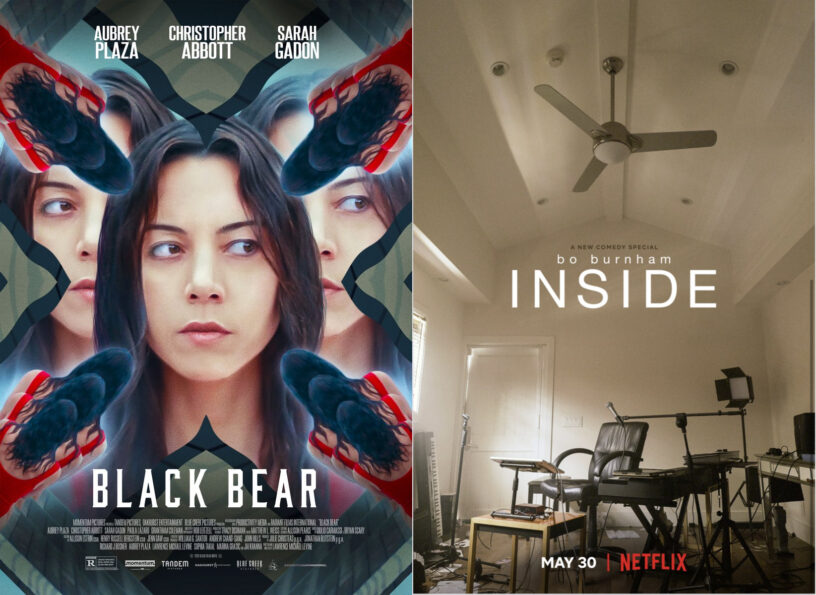Fran Lebowitz is a legendary New York author and public speaker with an estimated net worth of USD 4 million. Leibowitz has not published in 27 years. Despite beginning her novels Exterior Signs of Wealth and Progress, writer’s block has left Leibowitz’s fingers dangling above the keyboard since 1994. Dozens of psychological models have helped us understand exactly what goes into beginning a creative endeavour. But what about the ending? Bo Burnham’s Inside and Lawrence Michael Levine’s Black Bear both see their protagonists churned through their respective creative processes as the films explore the anatomy of their creative systems and the factors preventing them from letting go.
Black Bear, released January 24, 2020, follows a young filmmaker, Allison, searching for inspiration at couple Blair and Gabe’s cabin settled deep in the wilderness of the Adirondack Mountains. It is left completely ambiguous as to how much of Black Bear takes place in Allison’s mind, but by my interpretation everything after the first sundown is imagined. The film explores the feelings of betrayal and jealousy that simmer under the surface of everyday social minutiae as Allison manipulates her hosts into a fight, then imagines their night ending in a tragic car accident. She then switches around the roles, imagining herself in an emotionally abusive relationship with Gabe as he directs her and Blair in a movie called Black Bear. Conversely, Inside, released May 30, 2021, is played by a cast of one, Bo Burnham, who transforms the pool house featured at the end of his last special, Make Happy, into a stage for songs and comedic sketches. He covers subjects ranging from the digital commercialization of human emotion to parasocial relationships and, of course, his creative process.
Crucially, Inside is written, directed, performed, and edited entirely by Burnham, while Black Bear is a team production. This distinction defines the creative traps the artists set out for themselves. Burnham’s lack of external feedback and fear of his audience’s critique, expressed in “Don’t Wanna Know,” keep him perpetually adding material not to improve the final product but to delay the end. In Black Bear, Allison’s creative purgatory is symbolized by the mounting professional pressure of the film’s production and her husband’s manipulative directorial tactics coaxing a performance that threatens to damage her reputation. As described in “Look Who’s Inside Again,” Burnham feels “surrounded” by his fans, while Allison feels trapped by people that rely on her work for a livelihood, her peers.
Both movies also demonstrate the mechanics of their author’s creative processes in different ways. Black Bear shows Alison recasting her characters in new roles every time the black bear rears its head, bringing the story to a sudden conclusion. In her second iteration, guilted by her manipulation of Blair and Gabe, Allison places Gabe in her role as the controlling auteur while she plays the emotionally abused actress. She finds inspiration in the way she manipulated her peers for entertainment and incorporated that very idea into the next iteration of her story. Conversely, Burnham explores his control over his fans in his song “All Eyes On Me” by commanding their sympathy and attention. The guilt that leads to this song’s creation is caused by the way he commercializes his audience’s emotions, not unlike the very digital corporations he criticizes throughout the special.
In both cases, neither project is concluded with a triumphant explosion of creative genius, but rather a sort of removed acceptance. Allison smiles softly and walks towards the black bear, giving into the idea of imperfection to find an end to her story, while Inside sees a disheveled Burnham exhale and proclaim, “I think I’m done.” Everyone wants to imagine their favourite artist wielding the tools of their craft like a scalpel, precise and with unflinching confidence, every thought a final draft. But Inside and Black Bear reveal that for most creatives, their process is a pit and, for artists like Leibowitz, they sometimes never find their way out.





Leave a Reply